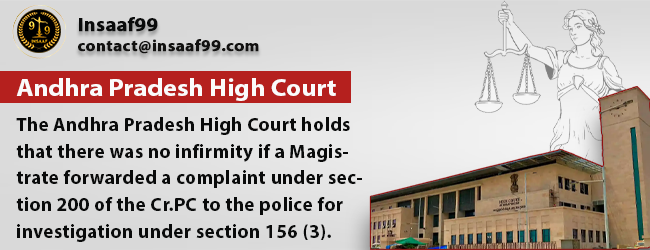2025-Jun-16

The Andhra Pradesh High Court holds that there was no infirmity if a Magistrate forwarded a complaint under section 200 of the Cr.PC to the police for investigation under section 156 (3).
The Andhra Pradesh High Court dismissed a quashing petition filed by an accused on the ground that the Magistrate was right in forwarding the complaint to the police as it disclosed various cognizable offences and the police could thoroughly investigate the matter.
The High Court observed that the complaint at hand was a prayer to the Magistrate himself to inquire into and proceed further. In such an event, two options were available for the learned Magistrate. He could embark upon enquiry in terms of Sections 200 and 202 of the Cr. PC. The other alternative available for him was to forward the complaint to the police for investigation.
The Petitioner in the quashing petition before the High court contended that the procedures under Section 154 Cr. PC were not complied with i.e. before filing the complaint to the Magistrate, the complainant has to attempt to have FIR registered and if the police fail to register such FIR, the grievance has to be put before the Superintendent of Police. But the written complaint failed to disclose these two procedural aspects.
It was also submitted by the Petitioners that an order of the Magistrate under Section 156(3) must contain brief reasons for forwarding the complaint to the police. But the order of the Magistrate was bereft of reasons. As a consequence, the complaint and the order failed to comply with the Hon'ble Apex Court decision in Priyanka Srivastava v. State of U.P. (2015).
The Hon’ble Court observed that the ruling in Priyanka Srivastava was not applicable as there was no misuse of criminal justice machinery in the present case.
“In the facts herein, the complaint before the Magistrate did not straight away request the Magistrate to forward the complaint to the police for FIR and investigation. Instead, the complaint contained the prayer that the Magistrate himself inquire into the matter. Since the complaint alleged various cognizable offences, the Magistrate exercised its power under Section 156(3) of CrPC for police to investigate into voluminous documents and records maintained by temple trustee. The complaint was thoroughly investigated and a charge sheet was also filed. The accused cannot raise this issue at a belated stage.”
What can the Legal Experts do for you? Our team of lawyers is ready to help you in minutes with any legal question.
 Whatsapp
Whatsapp
 Toll Free :-
1800-212-9001
Toll Free :-
1800-212-9001